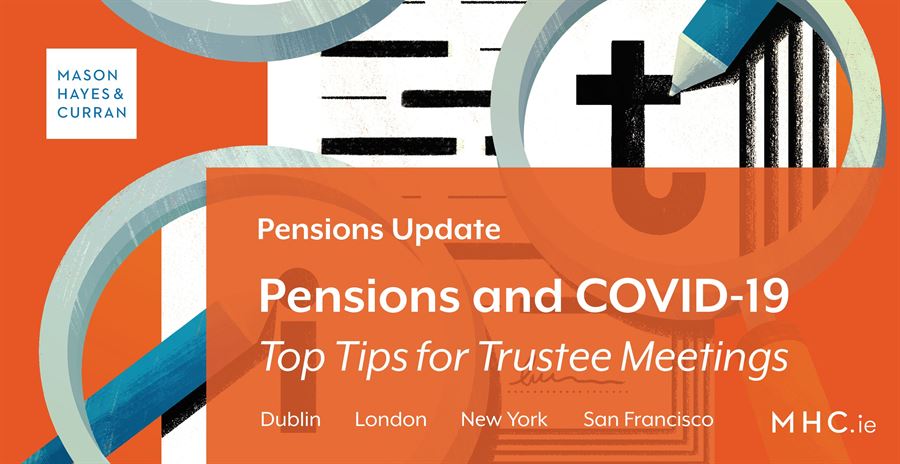
With the COVID-19 pandemic forcing so many of us to work from home and to convene remotely across various platforms, we address some practical issues that are being encountered by pension trustees.
The trust deed and rules
When it is deemed necessary to convene a trustee meeting by way of video conference or telephone conference call, the first action should be to consult the scheme’s trust deed and rules. Provisions relating to trustee meetings are typically found in this document. In cases where the scheme’s trust deed and rules have been recently consolidated or amended there may be an explicit provision that permits trustees to participate in a meeting by way of a telephone conference call or other communications platform which will allow the trustees to hear and to speak to one another.
 Amending the scheme documentation
Amending the scheme documentation
Where a scheme’s trust deed and rules are older there may not be a provision allowing the trustees to convene a meeting in this manner. In these instances, the trustees should consider legal advice and possibly look at allowing for a retroactive amendment of the trust deed and rules which permits trustee meetings to be convened virtually. An amendment like this will not be required in every case and will depend upon the existing wording in the scheme’s governing documentation.
If, following a review of the existing scheme wording, an amendment is considered necessary to facilitate virtual trustee meetings there are a number of factors that need to be considered.
Before the amending deed is put in place, careful consideration will need to be given to how the trustee’s intentions are framed in the amending deed’s recitals and legal advice will be required to ensure that the deed of amendment complies with the formal requirements of the trust deed and rules. Consideration might also be given to insertion of a clause that allows for trustees to dispense with the formal notice period for meetings during an emergency, such as a pandemic. The revised wording will also need to be robust enough to cover future technological advances and how these meetings will be managed from a practical perspective.
Sole corporate trustee
Where a scheme has a sole corporate trustee then that company’s constitution or articles of association will need to be reviewed to ensure that it can also convene meetings by way of telephone conference call or video conference.
Data protection
As trustees wrestle with new technologies, consideration needs to be given to the impact virtual trustee meetings may have on data protection issues. The trustees need to be satisfied that any technology they use to hold meetings does not negatively impact the matters or documentation that will be shared at trustee meetings. Documentation should only be shared on secure platforms with the appropriate level of encryption in place. Trustees also need full instructions on how to use these technologies so as not to inadvertently share member data outside the trustee group.
Technology
Before the virtual meeting is held, it will be necessary to ensure that each trustee can dial-in or connect to the meeting and that there are no other technical obstacles to the meeting going ahead.
When the trustee meeting is convened
When a virtual trustee meeting is finally convened, the chairman will need to confirm that a quorum is present at the meeting so that it may proceed to business. The chairman should also be active in ensuring that all trustees participate and that each of them is permitted time to contribute and to be heard. Where a trustee decision is required, the trust deed and rules should be consulted to ensure that decisions can be taken by written resolution. In most cases, this will be permitted by the scheme’s documentation but confirmation that this provision is included will need to be obtained. Consideration needs to be given as to how such requirements may be met when physical contact between the trustees is not possible. An amendment to the trust deed may be required to cover these situations.
Conclusion
The trust deed and rules are different for every pension scheme. In each case where the trustees require guidance on organising, holding or taking decisions at trustee meetings, it would be prudent to obtain legal advice from the scheme’s lawyers. The purpose of obtaining legal advice is to ensure that there can be no doubt that the meeting has been convened legitimately and that any decisions taken by the trustees cannot be queried as to their validity at a later date.
For more information on the unique issues encountered by trustees during the COVID-19 pandemic, contact a member of our Pensions team.
The content of this article is provided for information purposes only and does not constitute legal or other advice.
Share this:






